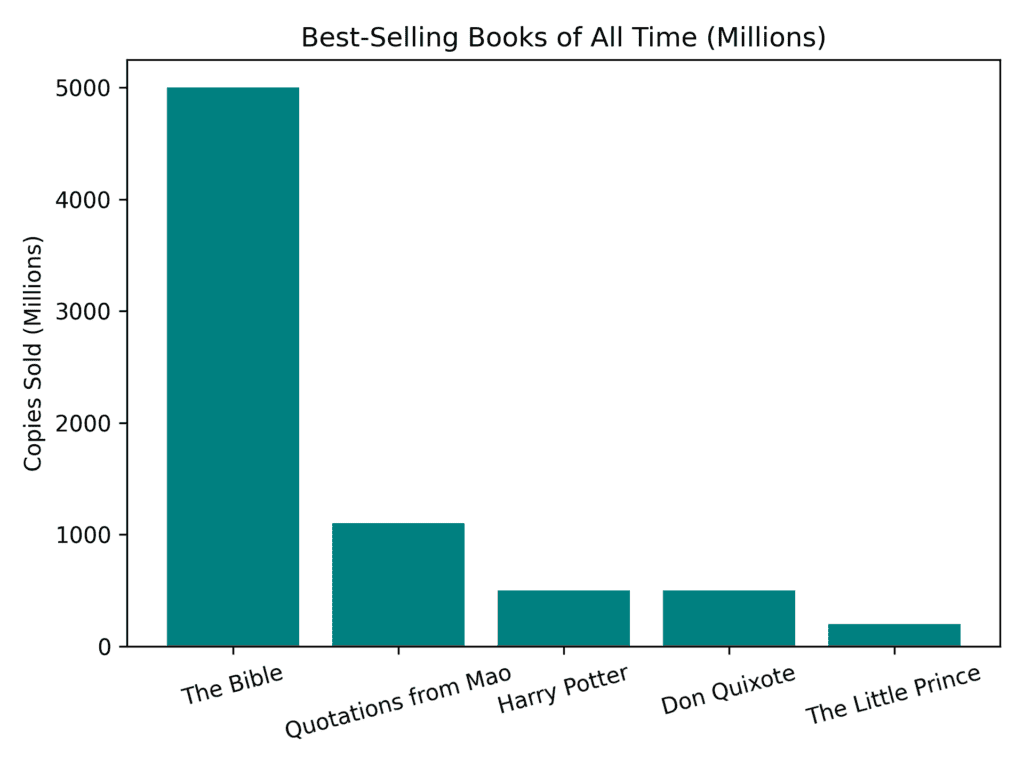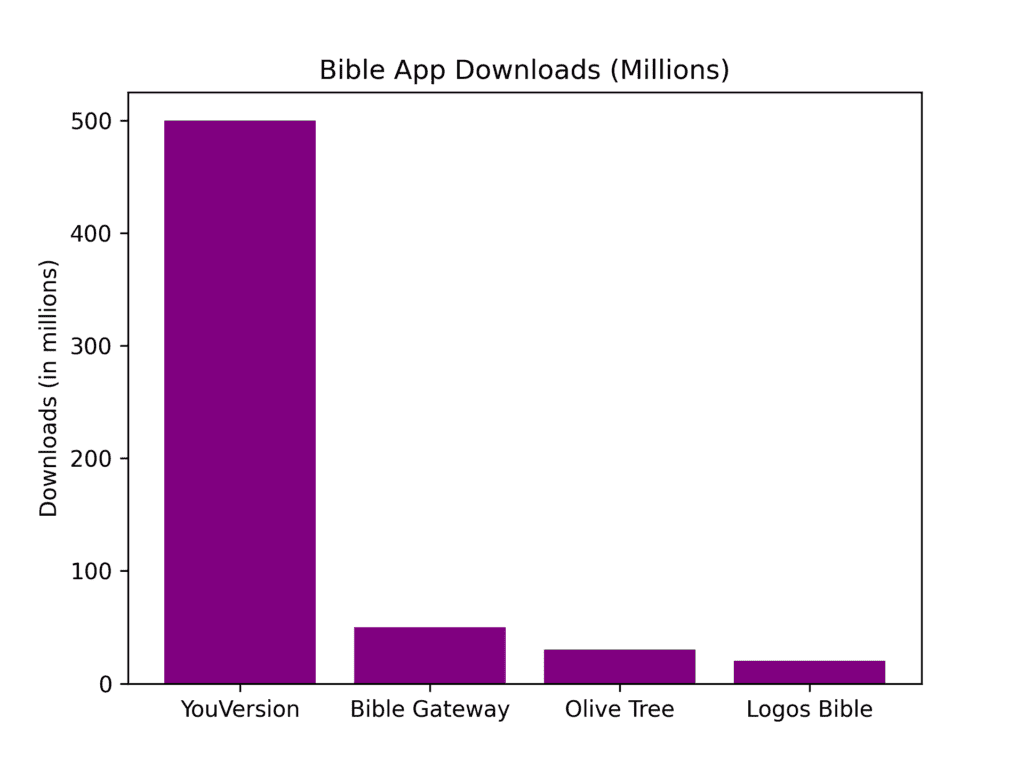If we’re taking a look at why the Bible is the best-selling book of all time, I have to preface this and say that I do have a bias as to the truth of the Bible. However, there are facts about the bible that are not based on bias of any kind, just facts.
As a Christian blogger who has spent most of my life in church ministry after becoming a Christian many years ago, the Bible is far more than just a religious book to me. It is the living, breathing Word of God.
It is a library of 66 books—letters, poetry, history, and prophecy—uniquely bound together with one ultimate purpose. I believe the Bible is God’s written Word to mankind, revealing His plan of salvation through the birth, life, suffering, death, and resurrection of Jesus Christ. This divine plan offers forgiveness of sins and eternal life to all who trust Him and call on His name.
The Bible’s unmatched influence and reach stem not only from its historical significance but also from its transformative power in the lives of individuals and societies. In this article, we’ll explore the remarkable reasons why the Bible remains the best-selling book of all time. From its monumental sales numbers to its profound cultural impact, we’ll uncover the factors that contribute to its enduring legacy.
The Bible: A Record-Breaking Bestseller
The Bible is not just a religious text; it’s a phenomenon. According to Guinness World Records, the Bible is the best-selling book of all time, with more than 5 billion copies sold. This figure is a conservative estimate and doesn’t include countless free distributions by missionary organizations or digital downloads.
For perspective, here’s how the Bible compares to other bestsellers:
| Book | Estimated Sales |
|---|---|
| The Bible | 5+ billion |
| Quotations from Chairman Mao | 1.1 billion |
| Harry Potter series | 500 million |
| Don Quixote | 500 million |
| The Little Prince | 200 million |
Chart: Best-Selling Books of All Time
The following chart visually demonstrates the Bible’s dominance in book sales:

Why the Bible Is the Best-Selling Book of All Time
1. Its Universal Themes
The Bible addresses timeless and universal themes that resonate deeply with people across all cultures and eras. Themes like love, forgiveness, hope, redemption, and justice are woven throughout its pages, offering wisdom and comfort to readers.
- New Testament Appeal: The New Testament, which highlights the life, death, and resurrection of Jesus Christ, speaks directly to humanity’s need for salvation and hope.
- Old Testament Prophecies: Many Old Testament prophecies are fulfilled in the New Testament, showing the Bible’s cohesive message across centuries.
2. A History of Global Influence
The Bible has been a cornerstone of cultural, moral, and legal systems for centuries. It has influenced the United States Constitution, the abolition of slavery, and the formation of countless charitable organizations. Its impact extends beyond religion, shaping literature, art, and philosophy.
- Examples in Literature: Iconic authors like Charles Dickens, J.R.R. Tolkien, and C.S. Lewis have drawn inspiration from the Bible.
- Modern Media: Even today, the Bible is frequently referenced in films, music, and TV shows, making its influence enduring and widespread.
3. Translation into Different Languages
One of the most remarkable factors contributing to the Bible’s success is its availability in different languages. As of 2023, the Bible has been translated into over 3,500 languages, with the full text available in more than 700 languages. This makes it accessible to more people than any other book in history.
- Foreign Bible Societies: Organizations like Wycliffe Bible Translators and the United Bible Societies work tirelessly to ensure that the Bible reaches even the most remote areas of the world.
- Impact of Digital Technology: Bible apps like YouVersion allow people to access Scripture in their native language with just a few taps on their smartphone.
4. Missionary Work and Free Distribution
Missionary organizations have played a significant role in the Bible’s widespread availability. Groups like The Gideons International have distributed billions of free Bibles in hotel rooms, hospitals, prisons, and schools worldwide.
- Guinness Book of World Records highlights how such efforts have made the Bible the most-distributed book of all time.

5. The Bible as a Sacred Text
For devout Christians, the Bible is not merely a collection of books—it is the Holy Bible, the inspired Word of God. This belief fuels a strong demand for personal and family copies of the Bible, making it a household staple in many Christian homes.
Different Versions
The Bible is available in numerous translations, each catering to different preferences for readability, accuracy, and theological nuance. Some of the most popular versions include:
- King James Version (KJV): Known for its poetic language and historical significance, it remains a favorite for traditional worship and study.
- New International Version (NIV): Renowned for its readability and balance between accuracy and clarity, making it a top choice for modern Christians.
- New American Standard Bible (NASB): Valued for its precise, word-for-word translation, often favored by scholars and serious Bible students.
- New Living Translation (NLT): Offers a thought-for-thought translation style, emphasizing readability and accessibility for contemporary readers.
- English Standard Version (ESV): A highly regarded word-for-word translation, often used in evangelical circles for both personal study and preaching.
- Christian Standard Bible (CSB): Combines accuracy and readability, appealing to a wide range of audiences.
- Revised Standard Version (RSV): A classic translation that bridges the gap between older and modern language styles.
The Bible’s Digital Revolution
In the 21st century, technology has amplified the Bible’s reach. Apps like YouVersion and Bible Gateway provide digital versions of Scripture that are accessible anywhere, anytime. These platforms offer features like reading plans, devotionals, and audio Bibles, making the Bible more interactive and engaging.
Chart: Digital Bible App Downloads

Counterarguments: Is Popularity Enough?
Critics often argue that high sales numbers don’t necessarily equate to readership. For example:
- Unused Copies: Many hotel Bibles remain unopened.
- Cultural Obligation: Some families buy Bibles for tradition rather than spiritual engagement.
However, the Bible’s influence on individual lives, communities, and societies transcends these criticisms. Its transformative power continues to make it a cornerstone of faith and culture.
The Case for Christianity and the Bible’s Teachings
While critics may question the Bible’s popularity or the actions of those who claim to follow its teachings, the case for Christianity remains rooted in the profound impact of its principles. The BIble has brought unparalleled freedom, peace, and the uplifting of humanity wherever its teachings are sincerely applied.
The Transformative Power of Biblical Principles
The teachings of the Bible have shaped societies, established moral frameworks, and inspired countless movements for justice and equality. Consider some of the key areas where biblical principles have made a difference:
- Freedom and Equality:
- The abolition of slavery in many parts of the world was driven by Christians who believed in the biblical teaching that all people are created in the image of God (Genesis 1:27).
- The concept of human rights, which underpins democratic societies, has roots in Christian beliefs about the inherent worth of every individual.
- Peace and Reconciliation:
- The teachings of Jesus, such as loving your enemies (Matthew 5:44) and turning the other cheek (Matthew 5:39), have inspired nonviolent movements, including the work of Martin Luther King Jr. during the Civil Rights Movement.
- Reconciliation and forgiveness, cornerstones of Christian practice, have helped heal divisions in families, communities, and even nations.
- Compassion and Service:
- Christian teachings have inspired the establishment of hospitals, orphanages, and charities worldwide, many of which continue to provide essential services today.
- The Bible’s call to care for the poor, widows, and orphans (James 1:27) has led to the creation of countless humanitarian efforts.
The Bible’s Practical Benefits for Daily Living
Even for those who do not believe that Jesus Christ was God in the flesh, the principles found in the Bible offer a blueprint for a better life:
- Integrity and Honesty: Biblical teachings emphasize truthfulness and integrity (Proverbs 12:22), which foster trust and healthy relationships.
- Hard Work and Stewardship: Passages like Colossians 3:23 encourage diligence and doing one’s best, leading to personal and professional success.
- Family and Community: Instructions for loving relationships (Ephesians 5:25; 1 Corinthians 13) strengthen families and communities, promoting stability and joy.
Wherever the actual teachings of the New Testament are tried legitimately, they tend to succeed in bringing about positive change. These teachings transcend culture, geography, and time, offering wisdom and guidance for every aspect of life.
The Ultimate Hope of Christianity
For Christians, the Bible is not merely a guide for living well on earth—it points to a far greater hope. At its heart, the Bible reveals God’s plan for salvation through Jesus Christ. It teaches that peace and joy in this life are only a shadow of the eternal bliss promised in heaven for those who trust in Him.
- Salvation Through Christ: Jesus Christ’s life, death, and resurrection provide a way for every person to be reconciled to God and experience eternal life (John 3:16).
- A Call to Embrace Faith: While living by Christian principles can improve life on earth, the greatest gift of the Bible is the invitation to know Jesus as Savior, ensuring peace and eternal joy.
Conclusion: A Message of Hope for All
The Bible’s teachings, when sincerely applied, have the power to transform individuals, families, and societies. Even for those who may doubt its divine origins, living by its principles often leads to a better and more fulfilling life. For Christians, however, the Bible represents far more—it is the roadmap to eternal life through faith in Jesus Christ.
As the most widely read and distributed book in history, the Bible continues to inspire, challenge, and guide people of all backgrounds. Its message of hope, love, and redemption remains as relevant today as ever, offering peace in this life and the promise of eternity in the presence of God.
Conclusion: A Legacy Like No Other
The Bible’s status as the best-selling book of all time is not just a reflection of its sales figures but also a testament to its profound impact on humanity. From its universal themes to its unmatched accessibility in different languages, the Bible remains a source of hope, guidance, and inspiration for billions of people worldwide.
Whether you view it as a historical document, a sacred text, or the living Word of God, the Bible’s influence is undeniable. Its enduring legacy ensures that it will remain at the top of the list of best-sellers for generations to come.





Leave a Reply